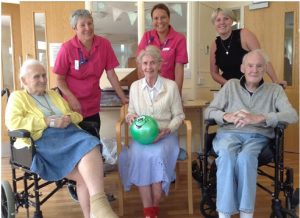A pioneering initiative designed to keep inpatients active and motivated has been extended to Hinckley and Bosworth Community Hospital.
Three Meaningful Activity Coordinators started working in the summer with patients on a variety of ways to add exercise, stimulation and fun to their days.
The project has been based on evidence elsewhere that shows that patients who stay active are more likely to have shorter stays in hospital, and are less likely to be readmitted later on.
They are also less likely to develop painful pressure sores.
A similar initiative started at Coalville Community hospital two years ago. Hinckley and Bosworth has two wards with a total of 39 patients, most of them aged 65 and older. Many of the beds are in rooms with only a small number of other patients, which limits opportunities for socialising.
Now Hinckley patients who want to take part can start the day with a communal buffet breakfast, instead of being handed a tray at their bed. This gives them a chance to meet and talk to other patients. It also helps the hospital team to identify how they are progressing and to agree the goals needed to support patients to safely return home.

Later in the day there is the opportunity to take part in light exercises, singing, games, arts and crafts and other pastimes. Those who are not well enough to join in the group sessions, or prefer not to, can have one-to-one sessions with activities such as completing jigsaw puzzles, knitting, or just talking. These activities are tailored to individual patient’s needs and preferences. During the football World Cup, the co-ordinators decorated the wards in football colours, and arranged communal opportunities to see the big games. This led to many
patients reminiscing about when they used to play the game. During Wimbledon fortnight, patients were treated to strawberries and cream. There was a tea party for the NHS’s 70th birthday in July, and more memories were shared during armed forces’ day celebrations.
Coordinator Jodie Toller said: “The job involves working with patients to get them into a different environment to work with them through creative means towards rehabilitation. It could be working on their fine motor skills, upper body movements, and encouraging their independence so they can regain confidence and support their recovery.”
Coordinator Su Barnett added: “Every day is different as we like the activities to be tailored to individual patients.
“If we can keep patients happy and stimulated in hospital it gives them a sense of purpose and aids their recovery.”
Natasha Bayliss, who joined in a session while visiting her father, said: “As I have come in today, he is actually doing these exercise classes and having a fun time with the other patients here and it is lovely to see. I would highly recommend it. It is mentally stimulating for the patients to be doing things like this.”
Her father, Graham Bayliss, said: “I have had a brilliant afternoon. I certainly welcome it for the hospital.”
Another patient said: “It is nice having different company and people to talk to. I liked being in a different room.”
A third added: “I found the activities very good and enjoyed being able to share my knowledge and experience.”
To see the Meaningful Activity Coordinators at work, watch this short film.
NOTES TO EDITORS
1. Leicestershire Partnership NHS Trust (LPT) provides community health, mental health and learning disabilities services for the one million people living in Leicester, Leicestershire and Rutland. We have a budget in excess of £275 million and employ approximately 5,500 staff.
2. Raising Health is our registered charity (number 1057361) which raises funds to support LPT’s excellent care initiatives, equipment and innovations which go above and beyond
core NHS provision, to enhance the experience of our patients, service users and staff. www.raisinghealth.org.uk .

